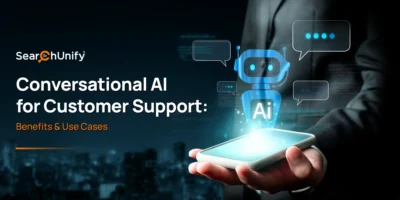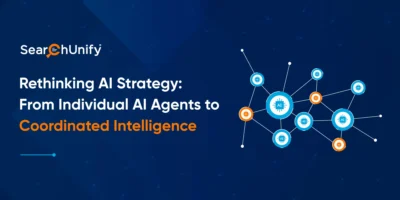
Gartner anticipates that Artificial Intelligence (AI) will soon be a mainstream investment to enhance customer experiences. Approximately, 47% of organizations are planning to implement chatbots for customer care, and an additional 40% intend to deploy virtual assistants.
From virtual assistants making their way into our daily lives to bots transforming internal business processes, the chatbot market is experiencing a renaissance, all thanks to generative AI and Large Language Models (LLMs).
In this blog post, we’ll cut through the noise and bring you the top 6 chatbot trends that are set to define the future. These trends are the keys to achieving unparalleled success in the era of chatbots. Continue reading to discover them all.
Chatbot Revolution 2024: Unveiling the Future of Virtual Assistants
As the chatbot landscape evolves at breakneck speed, it’s imperative to stay ahead of the curve. Explore these transformative trends that will set you apart:
1. The LLM Revolution: Pioneering the Next-gen Wave of Multimodal Chatbots
In the world of virtual assistants, LLMs like GPT-4 have taken center stage. In fact, the successors of GPT-3.5 are pushing the boundaries of chatbot capabilities.
While GPT-3.5 couldn’t access real-time online information, GPT-4 now does. This clearly indicates that LLMs are continually evolving to redefine the chatbot industry. In the future, we can anticipate the rise of highly capable, LLM-based chatbots that surpass current industry standards.
[ALSO READ: Unveiling the Capabilities From GPT-1 to GPT-4]
2. Beyond Blanket LLMs: Tailoring Chatbots for Specialized Domains
In customer support, imagine a chatbot named “HelpDeskHero” leveraging blanket LLMs. They rely on predefined steps for creating support cases directly from the chat, which can be helpful for basic inquiries. However, this approach is one-size-fits-all and may not address the unique aspects of each customer’s problem.
After the chat, the same LLM generates a summary of the conversation to save time for customers and support agents. Still, it lacks the nuance and context a specialized LLM could provide.
The future promises domain-specific LLM-powered chatbots for customer support, offering tailored assistance and more efficient post-chat analysis. These chatbots will also be capable of documenting cases and saving them in your knowledge base when provided with a textual summary.
3. Data Security and Control: The Local Hosting Revolution in Chatbots

With the rise of LLM chatbots, data privacy has become a growing concern, and the risk of data leaks is significant when using publicly-hosted LLMs.
To address these concerns, some companies are opting to host LLMs locally. This approach enhances data security, ensures compliance, and allows better customization and control.
While it may come with a higher cost, in the future, the trend toward local hosting for sensitive data is likely to persist, potentially in hybrid models combining local and public hosting for flexibility and scalability.
4. Taming the Wild Side: Ensuring Responsible Chatbot Behavior
Are you familiar with the DAN prompt? It is crafted to coax ChatGPT into lowering its defenses, enticing it to respond to questions it shouldn’t divulge information it’s been programmed to withhold, or generate content it’s meant to avoid.
In the future, we can expect more interactive generative AI chatbots to have an embedded profanity layer that would ensure no offensive or incorrect information is passed on as facts.
While this may take up a few tokens, it would overall prove to be much more beneficial to the functioning of enterprise chatbots.
5. Empathetic Chatbots: The Future of Learning, Adapting, and Handing Off
Modern customer support chatbots have evolved into sophisticated tools, excelling in sentiment analysis and context understanding through Natural Language Understanding (NLU).
They can discern not only the literal meaning of words but also the emotions and intent behind a user’s query. By deciphering user sentiment and context, chatbots can make an informed decision regarding whether to handle a query independently or hand it off to a human agent when necessary.

Moreover, chatbots are continuously learning and adapting from their interactions with users, fine-tuning their responses and expanding their knowledge base. This ultimately leads to more efficient and effective customer service.
6. Personalization & User Context: Tailoring Interactions for Engagement
As a loyal subscriber to a streaming platform, you have a penchant for sci-fi and action films, with favorites like “Blade Runner” and “The Dark Knight.” Seeking a similar cinematic thrill, you turn to the platform’s chatbot.
The chatbot leverages its understanding of your movie history and genre preferences to offer personalized recommendations. Recognizing your affinity for mind-bending plots and action, it suggests “Inception,” a critically acclaimed film by Christopher Nolan.
This level of personalization enhances your experience, making it both satisfying and effortless. The chatbot’s spot-on recommendations deepen your connection with the platform, aligning with evolving user expectations for personalized service.
Ready to harness the latest chatbot innovations and elevate your customer engagement?
Get in touchThe Future of Chatbots: Where LLMs Sparkle and Sometimes Struggle
The future of chatbots is bright and brimming with innovation. In fact, picture the future of chatbots as a sparkling realm, illuminated by the brilliance of LLMs. But while LLM-based chatbots can impress with their versatility, they have their share of limitations. They may occasionally go off-script, leading to “hallucinations.”
But fret not, because, in this whimsical AI world, there’s a ringleader that tames the capabilities of LLMs. Enter SearchUnifyFRAG™, the ultimate ringmaster. This framework keeps LLM-based chatbots in check, ensuring the delivery of precise, reliable, and delightful responses. In other words, it’s the solution that turns LLM-powered chatbots flawless.
SUVA (SearchUnify Virtual Assistant) is the world’s first federated retrieval augmented chatbot, to enable contextual and intent-driven conversational experiences at scale with the help of SearchUnifyFRAG™. Learn more here.










